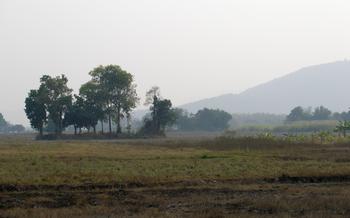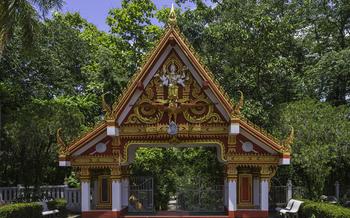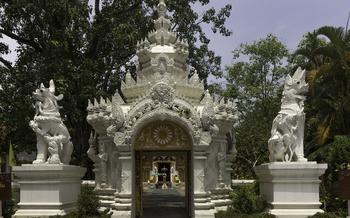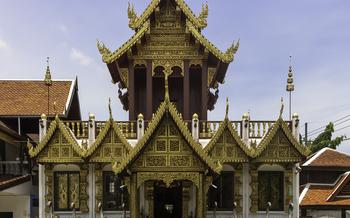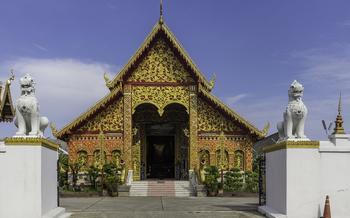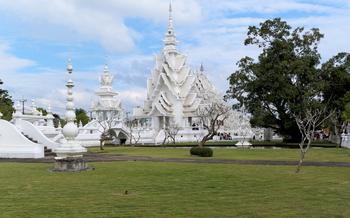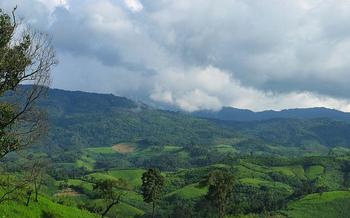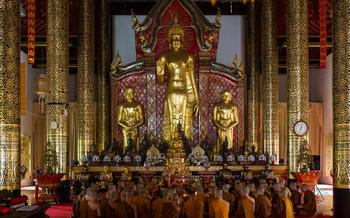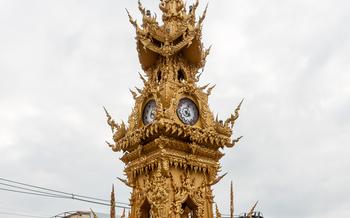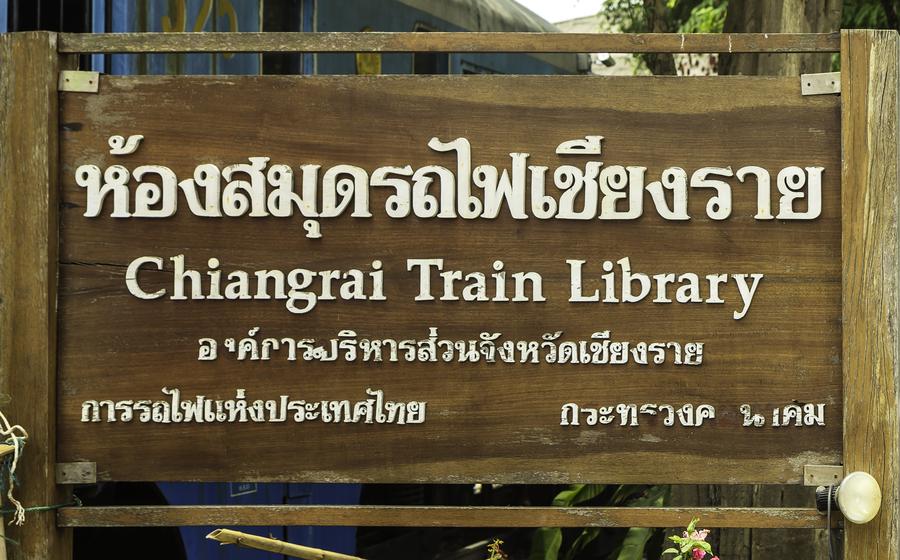
Yao Mountain Tea Plantation
- Historical Background:
- Location and Accessibility:
- Natural Beauty and Scenery
- Tea Production Process
- Tea Varieties and Flavors:
- Tea Tasting and Sampling:
- Cultural Encounters:
- Sustainable Agriculture:
- Health Benefits of Tea:
- Educational Tours and Workshops:
- Local Cuisine and Dining
- Health and Safety Information
- Photography and Social Media:
- Accommodation and Nearby Attractions
- Insider Tip:
Historical Background:
Chiang Rai has a rich history of tea cultivation, dating back several centuries. The Yao people, an ethnic group with a strong affinity for tea farming, played a pivotal role in introducing and developing this tradition in the region. They brought their knowledge, skills, and expertise from their ancestral lands in southern China, transforming the rugged mountains of Chiang Rai into a lush tapestry of tea gardens.
Over the years, the Yao Mountain Tea Plantation has gained significant recognition for its high-quality tea production. The unique climate, soil conditions, and traditional farming practices employed by the Yao people have resulted in teas with exceptional flavors and aromas. Today, the plantation stands as a symbol of cultural heritage, agricultural expertise, and the enduring legacy of the Yao people in shaping the tea industry of Chiang Rai.
Location and Accessibility:
The Yao Mountain Tea Plantation is nestled in the picturesque mountains of Chiang Rai, Thailand. Exact coordinates are available online or through the tourism office. The plantation can be reached by private transportation or by joining organized tours that depart from Chiang Rai city. Renting a car or hiring a taxi are convenient options for independent travelers, allowing them to explore the plantation at their own pace. Guided tours, often led by local experts, offer an immersive experience with insights into the history, culture, and tea-making process. Whether opting for self-guided exploration or guided tours, visitors are guaranteed a memorable journey into the heart of the Yao Mountain Tea Plantation.
Natural Beauty and Scenery
The Yao Mountain Tea Plantation is not just a place to learn about tea production; it's also a feast for the eyes. Nestled amidst rolling mountains and lush greenery, the plantation offers breathtaking views that will leave you in awe. As you walk through the tea gardens, you'll be greeted by a symphony of colors, from the vibrant green of the tea leaves to the delicate hues of the flowers that dot the landscape. The plantation's unique topography, with its winding paths and cascading terraces, creates a picturesque backdrop for photography enthusiasts. Whether you're a professional photographer or simply someone who loves capturing beautiful moments, the Yao Mountain Tea Plantation is a haven for nature lovers and shutterbugs alike. Take your time to explore the plantation's various viewpoints, and don't forget to bring your camera to capture the stunning scenery that surrounds you.
Tea Production Process
The Yao Mountain Tea Plantation employs traditional tea production techniques that have been passed down through generations. The process begins with the careful harvesting of tea leaves, which is typically done by hand to ensure the highest quality. The leaves are then processed through a series of steps, including withering, rolling, oxidation, and drying.
-
Withering: The freshly picked leaves are spread out on bamboo mats or wire mesh trays and allowed to wither under the sun or in controlled indoor conditions. This process reduces the moisture content of the leaves and initiates enzymatic reactions that contribute to the development of flavor and aroma.
-
Rolling: After withering, the leaves are rolled to break down the cell walls and release their juices. This step also helps to shape the leaves and promote oxidation. Rolling can be done by hand or using a machine.
-
Oxidation: During oxidation, the leaves are exposed to air, which causes them to turn from green to black. This process develops the characteristic color, flavor, and aroma of black tea. The degree of oxidation can be controlled by varying the amount of time the leaves are exposed to air.
-
Drying: Once the desired level of oxidation has been achieved, the leaves are dried to remove any remaining moisture. This step is crucial for preserving the quality and flavor of the tea. Drying is typically done in a controlled environment using hot air or sunlight.
Tea Varieties and Flavors:
The Yao Mountain Tea Plantation cultivates a diverse range of tea varieties, each boasting unique flavors and aromas that cater to different palates. Among the most popular teas grown here are:
-
Oolong Tea: Renowned for its floral and fruity notes, oolong tea undergoes a unique oxidation process that results in a delicate balance of flavors.
-
Black Tea: Offering a robust and full-bodied taste, black tea is oxidized for an extended period, resulting in a darker color and richer flavor.
-
Green Tea: Retaining its natural green color, green tea is lightly oxidized and offers a vegetal and refreshing taste.
-
White Tea: The most delicate and least processed of all teas, white tea is made from young tea buds and possesses a subtle and sweet flavor.
Visitors to the plantation have the opportunity to sample these different tea varieties and discover their own personal preferences. Whether you prefer the floral notes of oolong tea, the bold flavor of black tea, the refreshing taste of green tea, or the delicate sweetness of white tea, the Yao Mountain Tea Plantation offers a tea experience that is sure to delight your senses.
Tea Tasting and Sampling:
At the Yao Mountain Tea Plantation, visitors can indulge in the delightful experience of tea tasting and sampling. Guided tea tasting sessions are organized, providing an opportunity to learn about the different varieties of tea grown at the plantation and their unique flavors and aromas. Experts guide visitors through the art of tea tasting, teaching them how to properly appreciate the subtle nuances of each variety. During these sessions, participants can sample a variety of teas, including green tea, black tea, and oolong tea, each with its own distinct character. Visitors also have the chance to purchase high-quality tea products directly from the plantation, ensuring they can continue to enjoy the flavors of the Yao Mountain Tea Plantation at home.
Cultural Encounters:
Visiting the Yao Mountain Tea Plantation presents a unique opportunity for cultural immersion and exchange. The Yao people, who are the primary tea growers in the region, have a rich history, distinct traditions, and a deep-rooted connection to the land. Interacting with the Yao people allows visitors to gain insights into their way of life, customs, and beliefs. Whether it's observing their daily routines, participating in tea-making activities, or simply engaging in conversations, visitors can learn about the Yao culture firsthand and establish meaningful connections with the local community. The plantation serves as a platform for cultural exchange, where visitors can appreciate the diversity and beauty of Thailand's ethnic heritage.
Sustainable Agriculture:
The Yao Mountain Tea Plantation is committed to sustainable agricultural practices that protect the environment and preserve the natural ecosystem. Organic farming techniques are employed to maintain the health of the soil and promote biodiversity. Natural fertilizers and pest control methods are used to minimize the impact on the environment. The plantation also actively works to reduce water usage and promote water conservation practices. By embracing sustainable practices, the Yao Mountain Tea Plantation serves as a model for responsible tea cultivation and demonstrates the importance of preserving the natural beauty and resources of the region for future generations.
Health Benefits of Tea:
Tea has long been revered for its medicinal properties and health-promoting benefits. Scientific research has substantiated these claims, revealing the presence of potent antioxidants in tea leaves. These antioxidants, known as polyphenols, play a crucial role in protecting cells from damage and reducing the risk of chronic diseases.
One of the most significant health benefits of tea is its potential to prevent cancer. Studies have shown that regular tea consumption is associated with a decreased risk of certain types of cancer, including lung, prostate, and colorectal cancer. The antioxidants in tea help neutralize free radicals, unstable molecules that can damage cells and contribute to the development of cancer.
Tea also has a positive impact on cardiovascular health. It helps lower blood pressure, reduces cholesterol levels, and improves blood flow. The flavonoids present in tea have antioxidant and anti-inflammatory properties that contribute to these heart-protective effects.
Moreover, tea is an effective stress reliever. The amino acid L-theanine, found in tea leaves, promotes relaxation without causing drowsiness. L-theanine increases the production of alpha waves in the brain, which are associated with a state of calm alertness.
Educational Tours and Workshops:
The Yao Mountain Tea Plantation offers a range of educational tours and workshops designed to provide visitors with a deeper understanding of tea cultivation, processing, and tasting. These programs are led by experienced tea experts who share their knowledge and insights into the world of tea.
Participants can learn about the different stages of tea production, from harvesting and processing to drying and packaging. They will also gain insights into the unique characteristics of each tea variety grown at the plantation, including their flavor profiles and health benefits.
Hands-on experiences are a key part of these educational programs. Visitors can participate in tea picking, processing, and tasting sessions, gaining practical knowledge and a deeper appreciation for the art of tea making.
These educational tours and workshops are ideal for tea enthusiasts, aspiring tea connoisseurs, and anyone interested in learning more about this ancient beverage. They provide a unique opportunity to engage with local experts and gain a comprehensive understanding of tea cultivation and production in Chiang Rai.
Local Cuisine and Dining
During your visit to the Yao Mountain Tea Plantation, indulge in the flavors of traditional Thai cuisine and local delicacies. Several restaurants and eateries are located near the plantation, offering a variety of dishes to satisfy your taste buds. Enjoy a meal surrounded by the picturesque tea gardens, making your dining experience even more memorable.
One of the must-try dishes in Chiang Rai is "Khao Soi," a northern Thai curry noodle soup. The rich and flavorful broth, combined with tender noodles and crispy toppings, creates a culinary delight. Another local specialty is "Sai Oua," a northern-style sausage made with minced pork, herbs, and spices. Its unique flavor and aroma are sure to tantalize your taste buds.
For a refreshing treat, savor a glass of freshly squeezed sugarcane juice, a popular beverage in Thailand. The natural sweetness and thirst-quenching properties of sugarcane juice make it the perfect accompaniment to a warm day spent exploring the tea plantation.
Don't miss the opportunity to try some of the local fruits, such as mangosteen, rambutans, and lychee. These tropical fruits are known for their vibrant colors, exotic flavors, and abundance of nutrients. Whether you choose to dine at a restaurant or savor local snacks from street vendors, the culinary experiences around the Yao Mountain Tea Plantation will undoubtedly enhance your visit.
Health and Safety Information
Prioritizing your well-being is paramount when embarking on any adventure. While the Yao Mountain Tea Plantation is generally a safe and welcoming environment, taking certain precautions will enhance your experience. Firstly, don't forget your insect repellent, as mosquitoes and other insects may be present amidst the lush greenery. Secondly, opt for comfortable footwear, as you'll be traversing uneven terrain and exploring the plantation's trails. Thirdly, sun protection is essential, so carry sunscreen, sunglasses, and a hat to shield yourself from the tropical sun. Lastly, be mindful of local customs and traditions. The Yao people are known for their warm hospitality, but respecting their cultural norms and practices is crucial. This includes refraining from taking photographs without permission and dressing modestly when visiting their villages.
Photography and Social Media:
The Yao Mountain Tea Plantation is a visual masterpiece, inviting photography enthusiasts to capture its breathtaking beauty. Whether you're a professional photographer or simply someone who loves taking pictures, the plantation offers endless opportunities to create stunning images. From the rolling tea gardens to the majestic mountains in the backdrop, every corner of the plantation is a potential photoshoot location.
Share your experiences on social media using relevant hashtags like #YaoMountainTeaPlantation, #ChiangRai, and #Thailand. Inspire others to visit and explore this hidden gem by showcasing the plantation's natural wonders and the unique cultural encounters you had. Your social media posts can help spread the word about this incredible destination and encourage others to embark on their own tea adventures.
Accommodation and Nearby Attractions
For a truly immersive experience, consider staying overnight at one of the charming guesthouses or homestays in the vicinity of the Yao Mountain Tea Plantation. Wake up to the aroma of freshly brewed tea and enjoy the tranquility of the surroundings. Explore the neighboring villages and markets, where you can find locally made handicrafts, fresh produce, and delicious street food. For those seeking a multi-day adventure, combine your visit to the plantation with other attractions in the region, such as the stunning White Temple (Wat Rong Khun) or the bustling Night Bazaar in Chiang Rai. Plan your itinerary carefully to make the most of your time in this captivating area.
Insider Tip:
To fully immerse yourself in the beauty and serenity of the Yao Mountain Tea Plantation, plan your visit during the dry season, which typically runs from November to April. The weather during this period is ideal for tea cultivation, offering clear skies, pleasant temperatures, and low humidity. The tea leaves are at their peak during this time, resulting in a more flavorful and aromatic cup of tea. Moreover, the dry season provides excellent conditions for photography, allowing you to capture stunning images of the lush tea gardens against the backdrop of the majestic mountains. Embrace the tranquility of the plantation, sip on freshly brewed tea, and let the breathtaking scenery rejuvenate your mind, body, and soul.
